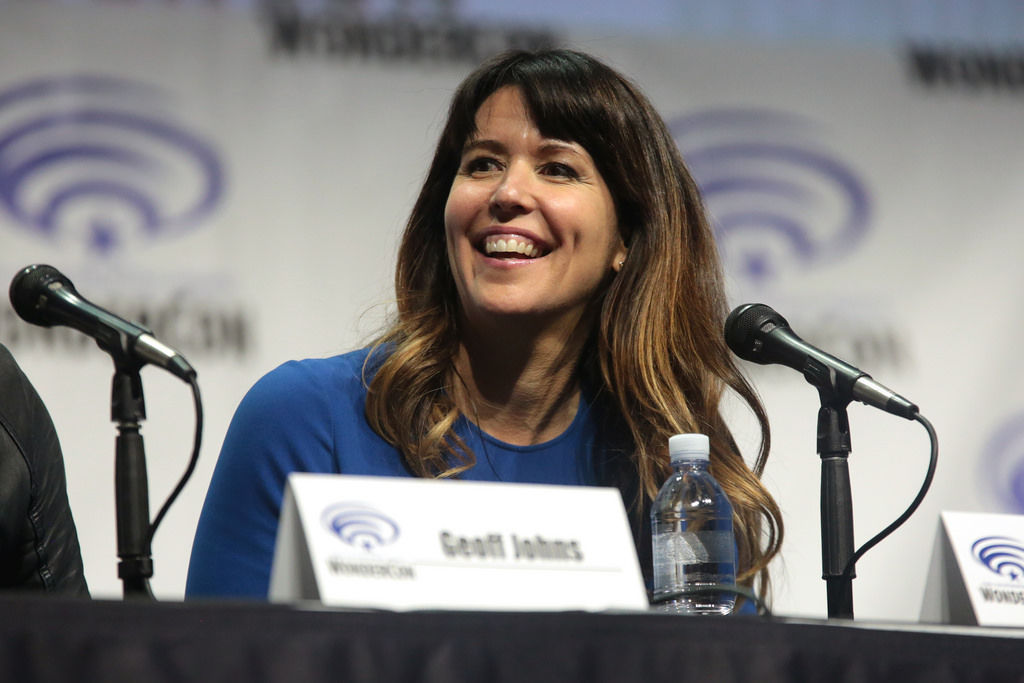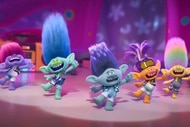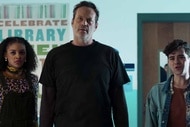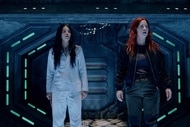Create a free profile to get unlimited access to exclusive videos, sweepstakes, and more!
The greatest female sci-fi directors of all time

January is a time of fresh starts and new beginnings. The way we kick off a new year informs the months that follow and that's why we're living our best Capricorn-season lives and declaring it the Month of the GOAT, celebrating the Greatests of All Time in genre. From the best Star Trek captains to our favorite strong female characters, we're honoring the greats all month long.
A new study from the Center for the Study of Women in Television and Film at San Diego State University recently revealed a disheartening but all too predictable reality of Hollywood: Women directors are not getting their fair shot at the top jobs. In 2017, 11% of the top 250 top-grossing movies were directed by women. Last year, that number sank to 8%. This came in spite of an amazing year for women directed films in terms of critical acclaim: Lynne Ramsay, Lucrecia Martel, Debra Granik, Chloe Zhao, Tamara Jenkins, Marielle Heller, to name but a few of the amazing women directors who knocked it out of the park in 2019.
Collating a list of the greatest female sci-fi directors ever was another reminder of how the industry is so often stacked against women: They get less opportunities, less news coverage, less awards, and less credit for the often amazing work they do. Their contributions to the narrative of film history are frequently boiled down to footnotes. It’s hard to talk about women exclusively as sci-fi directors because they are seldom able to establish themselves as such in the way men are. There really isn’t a female equivalent to George Lucas because few women, even today, are ever given the opportunity to do that (and now it’s 2019 and we still have no women directing Star Wars movies). Some names on this list are obscure and others may raise eyebrows but the purpose of this piece was to fill in the gaps in an oft-retold history that remains primarily defined by men for men. Women directors in sci-fi need to be included in those conversations across the board, be it relating to no-budget indie films or 9-figure blockbusters that are beloved by millions worldwide.
Fortunately, the future is looking brighter for women in high-profile sci-fi directorial positions. Chloe Zhao is helming The Eternals for Marvel, Cathy Yan is directing Birds of Prey for DC, Anna Boden will become the first woman to direct an MCU movie (alongside partner Ryan Fleck) when Captain Marvel premieres in March, Cate Shortland’s Black Widow movie is set for 2020, and the legendary French auteur Claire Denis’s High Life will premiere in America this year. There’s much to look forward to but for now, let’s look at a few of the women who got us here in the first place.
Agnieszka Smoczyńska (The Lure)
What do you get when you combine mermaids with cannibalism, feminism, Polish synth pop, and political commentary on life behind the Iron Curtain? You get one of the true modern masterpieces of 21st-century science-fiction. The Lure was the debut of Polish director Agnieszka Smoczyńska, and it was so damn brilliant that it was almost immediately inducted into the prestigious Criterion Collection. A riff on Hans Christian Andersen’s The Little Mermaid that works overtime to remind you of just how damn misogynistic that fairy-tale is, The Lure is a story of sex, exploitation, and how depressingly disposable women remain in society. The mermaids of the story are two sisters, Golden and Silver, who become performers in a tacky nightclub act, but when one falls for a human musician, she finds herself in the Catch-22 situation of patriarchal hell: Give up her tail and lose her voice, or be discarded by him and turn to sea foam. Smoczyńska takes no prisoners with The Lure, nor does she sacrifice stylistic mania for thematic consistency. It's a musical and a horror and a sci-fi and a political drama and it juggles all of these elements with remarkable skill. The gimmick of that plot may be what originally hooked viewers but The Lure will live on long after its original hype. Smoczyńska has immense promise as a director of genre fiction. Her dream project is a science-fiction opera based on David Bowie's album Outside. Bring it on.
The Wachowskis (The Matrix Trilogy, Speed Racer, Cloud Atlas, Jupiter Ascending)
It’s easy to downplay the sheer impact that Lilly and Lana Wachowski have had on 21st-century pop culture. The Matrix became a bona fide phenomenon that rewrote the language of Hollywood action cinema, blending philosophy with dystopian sci-fi and kung-fu movies to make something that raised the bar for an entire industry. There’s a whole generation of directors and creators who can trace their origins right back to Bullet Time and Keanu in that leather coat. But they didn’t stop there. Indeed, the Wachowskis may be the most audacious directors in their genre and on this scale. Even people who don’t like their films cannot deny the sheer ambition and kinetic frenzy of works like Speed Racer and Jupiter Ascending. Everything they do is utterly fascinating, even if it isn’t necessarily good on an objective level. Who else could have even attempted to make David Mitchell’s matryoshka doll of a genre juggling novel into a film? Even Jupiter Ascending is finally getting its fair dues as a Flash Gordon style camp classic that’s utterly unconcerned with the cishet male gaze. And we haven’t even gotten into Sense8! Alas, news broke last year that the Wachowskis have allegedly shuttered their production offices, allegedly because they feel they’ve already accomplished everything they set out to do in entertainment. We respect that but personally, we’d happily give the sisters $100m a year to do whatever the hell they want.
Patty Jenkins (Wonder Woman)
2017’s Wonder Woman has already cemented its place in cinematic history. The first female-led superhero movie in over a decade and the big-screen live-action debut of DC’s reigning queen, there was a lot riding on the critical and commercial success of this film. It didn’t take much in the early 2000s for the industry to declare that women-led superhero films weren’t worth the hassle and that the entire genre was dead because of a few disappointments. Add to that the growing pressure on the DCEU to revive its flagging fortunes, and Patty Jenkins had a lot to deal with. On only her second feature film as director, Jenkins had to not only craft an entertaining stand-alone film, she had to make a new installment in a franchise steeped in audience skepticism and give a decades-old icon the cinematic celebration she deserved. And boy did she do that. Wonder Woman isn’t perfect – like many superhero films, it stumbles in its third act and it’s still a movie beholden to a specific franchise aesthetic – but what Jenkins did to make something that will inspire a generation shouldn’t be downplayed. The way the film firmly establishes Diana Prince as a Capital I Icon, one with her foot firmly in a historical narrative, is all the bolder given that the story is a war drama that never loses its inherent optimism. Jenkins shoots scenes utterly free from cinematic notions of the male gaze and the Amazon fight scenes are choreographed to focus on strength over titillation, something that remains depressingly rare in the medium. With Wonder Woman, Jenkins set the standard for not just women-led superhero cinema but the genre as a whole. 2020 will see the release of Wonder Woman 1984, once again directed by Jenkins, once again making history.
Jennifer Phang (Advantageous)
Director Jennifer Phang won the Special Jury Award for Collaborative Vision at the 2015 Sundance Film Festival with her feature film Advantageous, based on an award-winning short film of the same name. Typically, we expect Sundance hits to burst onto the indie scene and make stars of their directors, who then go onto big things with major movies and Oscar success. It happens a lot for the dudes but sadly Phang has remained a hidden gem since her Sundance success. That's a shame because Advantageous is something truly special. A methodically paced character study that has as much in common with the Japanese film-maker Yasujirō Ozu as it does anything in sci-fi, Advantageous looks at the distinctly female side of a near future where misogyny still reigns supreme. Jacqueline Kim, who also co-wrote the film, plays a woman who sells cosmetic procedures for the Center For Advanced Health And Living, barely making a living as it is before she is fired. With few options on the table and desperate to find a way to ensure her daughter has a better future, Gwen agrees to a radical procedure that will transfer her consciousness into a new younger body. On a shoestring budget with immense sophistication, Phang creates a world that feels all too real in its seeming contradictions of being both highly advanced in terms of technology and depressingly backward in relation to treatment of women. It’s a world where women can be stripped of their identity, including their race, to pander to ingrained archaic notions of profitability and beauty. Phang and Advantageous wholly understand how the most gripping and important depictions of our future are the ones that are likely to become real. Track down this sinfully underrated film on Netflix now.
Lynn Hershman Leeson
Women directors are typically found doing their best work in the indie realm, often because they’re almost never offered the opportunities to move into bigger budgets or the rigor of the studio system. However, there are some female film-makers who are stridently independent and use the freedom and limitations of that to produce truly mind-boggling work. One such example is Lynn Hershman Leeson, an artist and film-maker whose work has been featured in art galleries worldwide. In the 1970s, she created an alter ego named Roberta Breitmore. As Roberta, she essentially lived full-time as a different person, complete with bank account and credit cards in that name, in order to tackle themes like consumerism and identity. She took this even further by introducing performers hired to be Roberta clones, and ultimately retired the performance with an exorcism on the grave of Lucrezia Borgia. Clearly, she’s fascinating, and this extends to Leeson’s film work too. Collaborating with actress Tilda Swinton, she made experimental sci-fi features Teknolust and Conceiving Ada. The former follows a scientist who injects her DNA into three cyborg clones who require a hefty dose of Y chromosomes to stay alive (guess how they get it), while the latter reimagines the life of mathematician Ava Lovelace, author of the first computer algorithm, by having her communicate across time and technology with a computer scientist obsessed with her. Lovelace’s life and achievements become a creative springboard for Leeson to explore themes of feminism and virtual reality, one foot firmly in history and the other straddling the speculative. Leeson’s work is unpolished and very indie, concerned more with ideas than traditional cinematic flair, but therein lies its fascinating appeal. It’s the kind of sci-fi that doesn’t get its due in the medium.
Kathryn Bigelow (Strange Days and Near Dark)
Before she made prestigious stories of the ravages of modern warfare on the American psyche, Kathryn Bigelow was the woman who made some of the most wildly enjoyable genre films of the late ‘80s and early ‘90s. Near Dark, a neo-vampire Western, mixes grindhouse style violence with a touching love story that never feels trite or shoehorned in, even as Bill Paxton murders everyone around them. Every shot looks stunning and achingly well-composed, blood-drenched but gorgeous. Near Dark eventually garnered a cult following, but her 1995 sci-fi thriller Strange Days was less well-received and its commercial failing almost derailed her career (a common story with women directors, and more so than their male counterparts, alas). Co-written by James Cameron (her ex-husband), Strange Days definitely deserves a critical re-evaluation as a socially conscious grungy film noir sci-fi that Bigelow pulls no punches with. Her story of a black marketer investigating the murder of a sex worker is extremely violent, even by the standards of the woman who made Near Dark, and that made the film controversial with many critics. New York Magazine critic David Denby called the film's rape scene "the sickest sequence in modern movies". It's a tough watch, to be sure, but Bigelow has never been a director to shy away from the brutalities of life, even in a speculative setting. Strange Days did get Bigelow some much-deserved recognition, as she became the first woman to win Best Director at the Saturn Awards. Nowadays, as the only woman to have ever won a Best Director Oscar, Bigelow seems more interested in tackling socially conscious topics, but we still hunger for a return to her genre days.
Mimi Leder (Deep Impact)
Mimi Leder has become better known as an industry-wide cautionary tale than a talented director who helped to define the modern age of television. Every time a story of “director jail” appears in the headlines following a film-maker's failed folly or financial disaster, Leder is typically named as one of the phenomena’s most prominent victims. She made one of the biggest movies of 1998, but her follow-up was considered such a disaster (spoiler alert: it did okay financially) that it took her nine years to make another movie and she herself admitted she was essentially blackballed from the industry for it. The legacy of her 1998 disaster movie Deep Impact is not helped by its competition with another asteroid collision film from the same year, Michael Bay’s commercially successful effort, Armageddon. That film may have made more money but it’s Leder’s Deep Impact that’s stood the test of time. Leder never sacrifices human emotion or character in favor of spectacle because she does both with such deft skill. You actually care about the people whose lives are at risk by this comet, which isn’t something you can always say with an old-school disaster movie. Putting an entertaining popcorn film like Deep Impact on a list with the term “greatest” in its title may make some sceptical, but Leder deserves her places in the narrative of women directors in sci-fi because she was one of the voices who proved once and for all that this genre, with all its bombast and high stakes, wasn’t just a boy’s game. It’s just a shame she hasn’t been given more opportunities to prove herself as a blockbuster figure. Such is the story of women in Hollywood.














